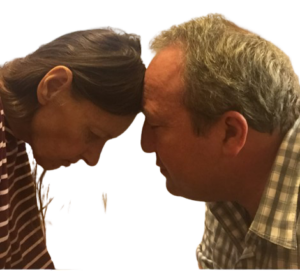Frontotemporal Degeneration (FTD)
US must also include our FTD community at large.
What is this FTD about anyway? You might have Googled dementia care and this site popped up. As you read on, you may decide you or your loved one really has symptoms not at all like what I describe here, or maybe they are spot on. I know I had never heard of FTD before a neurologist diagnosed my beautiful wife in June 2016. Then I read. I read a lot.
While most of us have heard of Alzheimer’s, did you know that FTD is the most common form of dementia for people under sixty? It is also one of the most misdiagnosed.
I met a woman who read our book and took great exception to me stating that FTD was nothing like Alzheimer’s. She explained her husband’s symptoms and told me that his Alzheimer’s was in fact very much like my wife’s FTD. She also explained to me that the treatments and care recommendations frustrated her because they really did not help.
I asked her how confident she was in the Alzheimer’s diagnosis. You could feel her mind shift in that moment. The thought of a misdiagnosis had never occurred to her. I am no expert, but suggested she get a second opinion. She did and received an FTD diagnosis for her husband.
The medical industry characterizes FTD as a progressive disorder of the brain effecting language, behavior, and/or movement. The industry also refers to it as Frontotemporal Lobar Degeneration or Pick’s Disease. My wife had semantic variant Primary Progressive Aphasia (svPPA), one of multiple clinical subtypes of FTD:
-
- Behavioral Variant
- Primary Progressive Aphasia (language) Variants:
- Semantic
- Agrammatic (Nonfluent)
- Logopenic
-
- Movement Disorders:
- Corticobasal syndrome
- Progressive supranuclear palsy
- FTD with Parkinsonism
- FTD with amyotrophic lateral sclerosis (FTD-ALS or FTD with motor neuron disease)
- Movement Disorders:
The commonality between the subtypes of FTD? As of this writing, there is no cure, and it is fatal.
As I stated, my wife had the svPPA. She started out with difficulty finding the right words and losing the understanding of what certain words meant. She would talk about things in vague terms, often dropping nouns, using similar sounding words, or even confusing pronouns. Her struggle to sort things in her head, like her birthday, came across as memory loss. She did not have memory loss.
Obviously, when you see yourself struggling with these things, you speak less and do not want to communicate, because it feels impossible.
She had difficulty understanding what other people said, especially when receiving and acting on instructions. Whether someone provided new instructions, or her brain was incorrectly telling her how to use familiar and typical objects in the home, it developed into an immense struggle. It quickly escalated to the point that she would freeze—unable to proceed.
She developed problems with reading and writing, eventually to the point that she could hardly do either. Imagine having full use of your hand but being unable to tell it to sign your name. As the disease progressed, other symptoms developed: changes in her behavior, senses, and mobility.
This gives you the smallest insight to just one of the variants of FTD.
Want to Learn More about FTD?
We have a list of leading organizations in the field with links to their websites.




